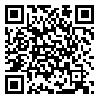دوره 11، شماره 1 - ( 6-1404 )
جلد 11 شماره 1 صفحات 46-33 |
برگشت به فهرست نسخه ها
Download citation:
BibTeX | RIS | EndNote | Medlars | ProCite | Reference Manager | RefWorks
Send citation to:



BibTeX | RIS | EndNote | Medlars | ProCite | Reference Manager | RefWorks
Send citation to:
Rajai N, Parandeh A, Azizi M, Mahmoudi H, Abbasian K. Self-sacrifice in Nursing During the COVID-19 Pandemic: Concept Analysis With the Rogers Approach. Health in Emergencies and Disasters Quarterly 2025; 11 (1) :33-46
URL: http://hdq.uswr.ac.ir/article-1-624-fa.html
URL: http://hdq.uswr.ac.ir/article-1-624-fa.html
Self-sacrifice in Nursing During the COVID-19 Pandemic: Concept Analysis With the Rogers Approach. فصلنامه سلامت در حوادث و بلایا. 1404; 11 (1) :33-46
چکیده: (404 مشاهده)
Background: Sacrifice is a fundamental professional value in nursing, which became particularly prominent during the pandemic of COVID-19 pandemic. This study investigated the idea of self-sacrifice in nursing during this period, employing Rodgers’s evolutionary model as the analytical framework.
Materials and Methods: The Rodgers’ concept analysis method was applied. Relevant literature was searched in CINAHL, MEDLINE, Web of Science, SCOPUS, PubMed, Magiran, IranMedex, and SID databases using keywords related to self-sacrifice in nursing. Seventeen related articles were selected for analysis.
Results: Self-sacrifice was a defining feature of nursing during COVID-19, involving prioritizing patient care over personal well-being despite severe risks. Internal factors influencing self-sacrifice included personal commitment, stress reduction, and professional excellence. External factors encompassed societal expectations, media influence, and the high-risk nursing environment during the pandemic. While self-sacrifice strengthened professional identity and personal growth, it also resulted in adverse effects, including work attendance despite illness (presenteeism), emotional and physical exhaustion (burnout), reduced patient safety, and a greater likelihood of leaving the profession.
Conclusion: Although self-sacrifice is an integral part of nursing, its adverse effects must be mitigated by promoting self-care and improving working conditions to ensure sustainable commitment among nurses.
Materials and Methods: The Rodgers’ concept analysis method was applied. Relevant literature was searched in CINAHL, MEDLINE, Web of Science, SCOPUS, PubMed, Magiran, IranMedex, and SID databases using keywords related to self-sacrifice in nursing. Seventeen related articles were selected for analysis.
Results: Self-sacrifice was a defining feature of nursing during COVID-19, involving prioritizing patient care over personal well-being despite severe risks. Internal factors influencing self-sacrifice included personal commitment, stress reduction, and professional excellence. External factors encompassed societal expectations, media influence, and the high-risk nursing environment during the pandemic. While self-sacrifice strengthened professional identity and personal growth, it also resulted in adverse effects, including work attendance despite illness (presenteeism), emotional and physical exhaustion (burnout), reduced patient safety, and a greater likelihood of leaving the profession.
Conclusion: Although self-sacrifice is an integral part of nursing, its adverse effects must be mitigated by promoting self-care and improving working conditions to ensure sustainable commitment among nurses.
| بازنشر اطلاعات | |
 |
این مقاله تحت شرایط Creative Commons Attribution-NonCommercial 4.0 International License قابل بازنشر است. |





